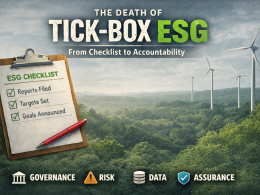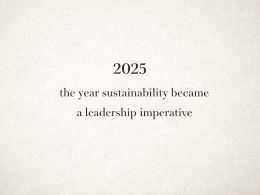For decades, procurement was regarded as a transactional back-office function – focused on purchase orders, supplier negotiations, and cost reduction. Yet the past few years have rewritten that narrative. In an era marked by climate volatility, supply chain fragmentation, and digital acceleration, procurement has emerged as a central pillar of business transformation.
Organisations that once viewed procurement as a cost centre now see it as a catalyst for resilience, innovation, and sustainable growth. The function is quietly redefining how global businesses deliver impact across environmental, social, and governance (ESG) dimensions.
From cost control to value creation
The success of procurement is no longer measured by how much money can be saved but by how effectively value is created. The lowest-cost supplier may introduce the highest hidden risks such as modern slavery exposure, non-compliance, or reputational damage.
Business leaders are now reframing procurement as the engine of long-term competitiveness. Data from a report on AI adoption in procurement suggest that more than 70 per cent of organisations use AI for supplier discovery and selection, while over half have achieved measurable sustainability improvements through technology adoption. These findings indicate that procurement is moving from tactical cost control to strategic foresight.
Steps to operationalise sustainable procurement
- Embed sustainability into every stage: Sustainability should be written into procurement policy rather than added later. Leading organisations integrate ESG criteria throughout the supplier lifecycle, from RFI to performance evaluation, ensuring environmental and social considerations influence every purchasing decision.
- Drive transparency through verified data: Visibility is the foundation of sustainable procurement. Organisations that invest in verified supplier data, independent audits, and ongoing monitoring gain a clearer understanding of ethical, environmental, and safety performance. This transparency helps set measurable goals and strengthens accountability across the value chain.
- Leverage collaborative digital platforms: Digital ecosystems enable procurement teams and suppliers to collaborate in real time, monitor compliance, and share improvement frameworks. Predictive analytics and intelligent dashboards allow early identification of risk, enabling proactive engagement rather than reactive remediation. When integrated effectively, these tools deliver scalable and auditable insights that support stronger decision-making.
Beyond compliance: The broader value
Sustainable procurement enhances far more than compliance records. Environmentally, it reduces carbon intensity and resource waste. Financially, it mitigates disruption and regulatory risk. Reputationally, it builds trust among investors and consumers who increasingly reward transparent and responsible operations.
In the same study, organisations implementing AI in procurement reported 55 per cent cost efficiencies alongside improved supplier management outcomes. These dual gains show that ethical and data-driven sourcing not only align with ESG goals but also improve performance and resilience.
Data as a catalyst for responsible growth
Digital intelligence is redefining how procurement manages complexity and accountability. Predictive analytics and automated validation now make it possible to map supplier networks across multiple tiers and verify sustainability claims at their origin. These advances are helping procurement leaders focus due diligence where it creates the greatest impact.
Data from a recent report on AI adoption in procurement suggest that 69 per cent of organisations already use predictive tools for supplier performance and risk analysis, yet 90 per cent remain unsure how to measure their return on investment. Building clear evaluation models that capture both financial and sustainability outcomes will be critical to scaling adoption and embedding data-driven decision-making at the heart of responsible growth.
The road ahead
Operationalising sustainability is an iterative process of alignment between data, people, and purpose. Procurement teams hold the levers to influence supplier behaviour, decarbonisation pathways, and social equity across industries.
The next decade will belong to organisations that treat procurement as a strategic enabler – one that uses verified data, AI-driven insight, and collaborative partnerships to translate sustainability commitments into measurable results. The intersection of intelligence and integrity will define the new standard of global supply chain leadership.
(Authored by Jake Bristow, Sales Director – APAC, Achilles Information Limited)




















